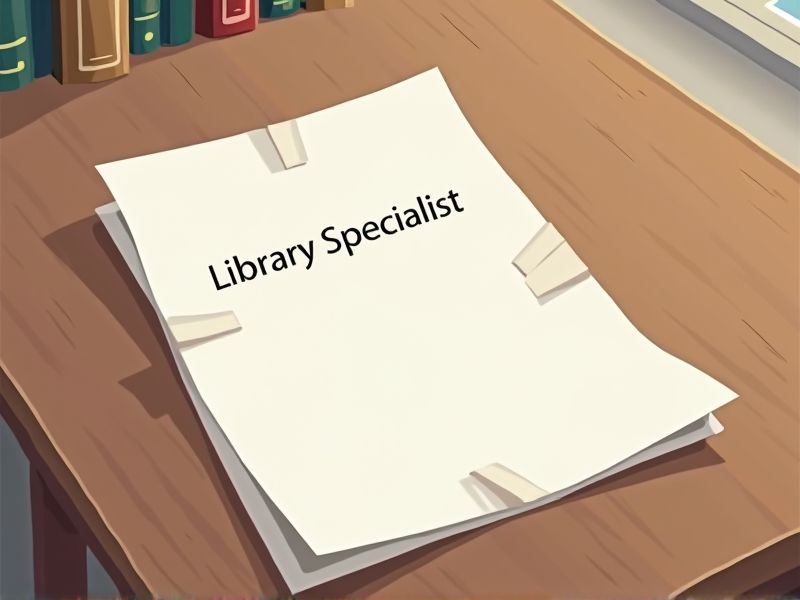
Library Specialists require specific certifications to keep up with evolving information management technologies and methodologies. These credentials help validate skills in areas like cataloging, reference services, and digital resource management, which are crucial for efficient library operations. By obtaining such certifications, Library Specialists can demonstrate their proficiency and commitment to maintaining high standards in information organization and accessibility. Essential certifications that may enhance your career as a Library Specialist include the following.
Certified School Library Media Specialist (CSLMS)
The presence of a Certified School Library Media Specialist (CSLMS) enhances student literacy rates and research skills through curated resources and structured support. Training received by CSLMS in information literacy educates students in effectively navigating and critically assessing digital information. Experts in educational technology, CSLMS ensure that the library remains a dynamic learning space equipped with current digital tools, thus increasing overall student engagement. Collaborative efforts between teachers and CSLMS lead to integrated curriculum support, fostering a more comprehensive educational environment.
Certified Public Library Professional (CPLP)
The CPLP certification provides library specialists with a standardized measure of their skills and expertise, which can enhance employment opportunities and professional growth. It ensures that library professionals stay current with evolving library science practices and technological advancements. Libraries with CPLP-certified staff are often perceived as more credible and committed to high service standards, attracting more patrons and stakeholders. The certification also fosters a community of practice among library professionals, encouraging networking and the sharing of best practices.
Certified Archivist (CA)
An increased reliance on proper archival practices requires a Certified Archivist to ensure the effective preservation and organization of library materials. The CA credential indicates specialized knowledge in managing, appraising, and preserving documents, which elevates the quality of resource management. Proper archiving practices facilitated by a CA enhance access to historical data, improving research outcomes and organizational efficiency within libraries. Libraries benefit from CAs through improved compliance with industry standards and regulations, safeguarding their collections over time.
Certified Digital Archives Professional (CDAP)
The increasing volume of digital information necessitates specialized skills, which a Certified Digital Archives Professional (CDAP) can provide, to efficiently manage and preserve these resources. Digital materials require unique strategies for access, which CDAP training equips library specialists with, ensuring effective information retrieval. Regulatory compliance in digital information management is a growing concern; CDAP certification helps library specialists adhere to these standards. Technological advancements continuously reshape archival processes, and a CDAP-certified professional remains adept at adapting these changes to library settings.
Certified Information Professional (CIP)
Library specialists manage vast information resources. Certification like CIP ensures they possess up-to-date skills in handling digital and traditional information. Libraries increasingly rely on technology for cataloguing and access, so certified professionals bring valuable expertise. As information sources diversify, certified individuals uphold standards of organization and accessibility.
Certified Records Manager (CRM)
Certified Records Manager (CRM) enhances a Library Specialist's expertise in managing information systematically, which can improve organizational efficiency. This credential ensures the specialist has a comprehensive understanding of compliance and legal requirements, reducing risks associated with information handling. Possession of the CRM certification can raise the credibility and trust in a specialist's ability to maintain and preserve important records. The certification also equips the professional with skills to implement effective records management strategies, potentially resulting in cost savings and improved resource utilization.
Library Leadership Certification (LLC)
Library Leadership Certification (LLC) enhances the skills of a library specialist by providing training in management and strategic planning, resulting in more effective library operations. Leadership certification ensures specialists are equipped to handle evolving challenges in digital resource management and community engagement. By having LLC, library specialists are empowered to implement policies that improve service delivery and user satisfaction. As libraries expand their roles in education and community support, certification validates a specialist's competencies in leadership and innovation.
Metadata Specialist Certification (MSC)
The Metadata Specialist Certification equips library specialists with advanced skills in organizing and managing digital and print resources, enhancing their ability to streamline information retrieval. Libraries face increasing volumes of diverse data formats; thus, a certified specialist can implement efficient metadata frameworks to improve access and user experience. The certification provides in-depth knowledge of metadata standards and practices that are critical in maintaining the accuracy and interoperability of library databases. As libraries evolve into modern information hubs, professionals with specialized certification in metadata are essential to bridge gaps between traditional cataloging and modern informational needs.
Project Management Professional (PMP)
Obtaining a PMP certification enhances a library specialist's ability to manage complex projects such as digitization initiatives or reorganizing collections. It equips them with the skills to effectively allocate resources, ensuring projects stay within budget and on schedule. The certification provides methodologies to mitigate risks, which is crucial for maintaining the accessibility and integrity of library resources. It also fosters improved communication skills, facilitating better collaboration among team members, stakeholders, and the community the library serves.
Microsoft Office Specialist (MOS)
Achieving Microsoft Office Specialist (MOS) certification equips a Library Specialist with proficient skills in essential software, facilitating efficient management of digital cataloging and data entry tasks. Enhanced proficiency in Microsoft Office tools allows for streamlined communication and collaboration within library teams and with patrons. Insight gained through MOS certification enables Library Specialists to create more effective presentations and documents, improving user engagement and information dissemination. Familiarity with these software tools aids in quick adaptation to evolving digital library technologies and processes.
Summary
When you obtain certifications as a Library Specialist, you enhance your skills and professional credibility. This typically leads to greater job opportunities and potential career advancement. Employers often recognize certified specialists for their commitment to continuing education, which can result in increased responsibilities and higher compensation. Enhanced expertise also empowers you to improve library services and better meet the needs of patrons.
